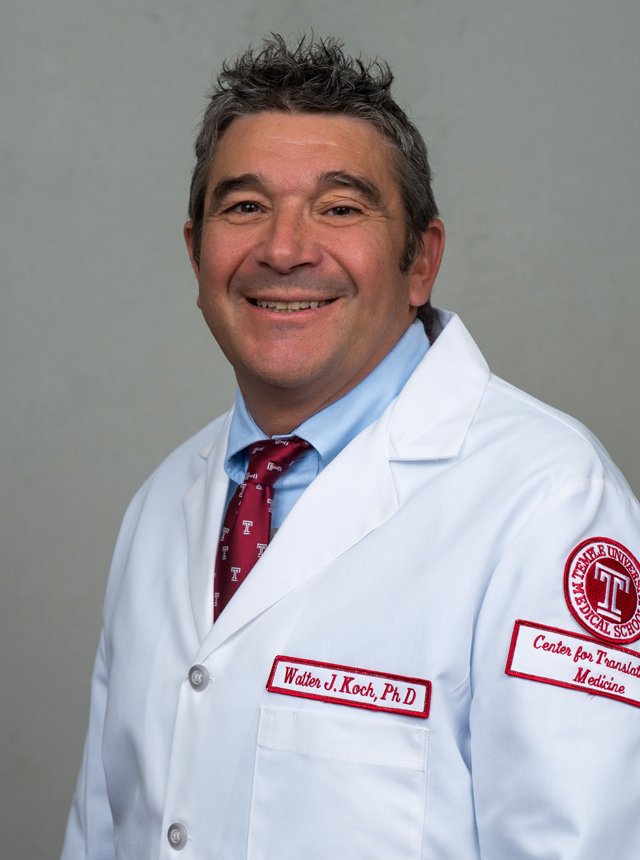Temple’s Dr. Walter J. Koch to Receive the International Society for Heart Research 2020 Research Achievement Award
 Walter J. Koch, PhD, W.W. Smith Endowed Chair in Cardiovascular Medicine, Professor and Chair of the Department of Pharmacology, and Director of the Center for Translational Medicine at the Lewis Katz School of Medicine at Temple University, has been selected as the recipient of the 2020 Research Achievement Award (RAA) – the most prestigious honor given to a senior researcher by the International Society for Heart Research (ISHR). Dr. Koch is one of two recipients of the 2020 RAA, with Dr. Livia Hool from the Victor Chang Cardiac Research Institute in Australia also selected.
Walter J. Koch, PhD, W.W. Smith Endowed Chair in Cardiovascular Medicine, Professor and Chair of the Department of Pharmacology, and Director of the Center for Translational Medicine at the Lewis Katz School of Medicine at Temple University, has been selected as the recipient of the 2020 Research Achievement Award (RAA) – the most prestigious honor given to a senior researcher by the International Society for Heart Research (ISHR). Dr. Koch is one of two recipients of the 2020 RAA, with Dr. Livia Hool from the Victor Chang Cardiac Research Institute in Australia also selected.
Dr. Koch was nominated and chosen to receive the RAA by ISHR peers for his work in pioneering and advancing the study of G protein-coupled receptor (GPCR) kinases (GRKs) in cardiovascular physiology and disease. He was one of the first to suggest that GRKs influenced heart function, and 25 years later, he remains a leader in GRK heart research.
“To be included with past winners of the RAA and to be recognized by peers for this award is a big honor,” Dr. Koch said. “I have benefited from wonderful trainees in my lab over the past years, and I couldn't have reached this point without them.” Over the last 25 years, Dr. Koch has trained more than 60 pre- and post-doctoral fellows in his laboratory.
Dr. Koch started his own lab in 1995 at Duke University, where his research became increasingly focused on the role of GRK2 and GRK5 in heart function. One of his early major breakthroughs was showing that alterations in GRK2 activity directly impacted heart function, which was soon after followed by his discovery that GRK2 plays a role in cardiac injury. Part of that work involved the development of a GRK2 inhibitor, known as βARKct, which currently is being investigated as a possible gene therapy for patients with heart failure.
In 2003 Dr. Koch moved his lab to Thomas Jefferson University, where he established the Center for Translational Medicine. While there, he discovered that in heart cells, GRK2 and GRK5 influenced heart function through pathways unrelated to their usual GPCR activities. The realization of these so-called noncanonical activities of GRK2 and GRK5 provided much-needed insight into abnormalities in heart cells that arise in the setting of heart failure and other cardiovascular diseases. The discovery also made GRK2 and GRK5 attractive drug targets.
Dr. Koch moved his Center for Translational Medicine to LKSOM in 2012, and since then, he and colleagues have been working tirelessly to identify small molecule inhibitors of GRK5 and GRK2. Much of Dr. Koch's ongoing research now centers on the development and clinical study of GRK inhibitors.
“GRK inhibition in patients with heart failure could have life-changing effects,” Dr. Koch explained. “If GRK inhibitors work, they would be an entirely new class of drugs.”
Dr. Koch has also served on numerous committees and boards in the effort to advance cardiovascular research, including serving as chair of the National Institutes of Health Cardiac Contractility and Heart Failure Study Section and chair of the American Heart Association’s Council Operations Committee. He has been a member of the ISHR since 1997 and a fellow of the ISHR since 2010. Dr. Koch was a previous recipient of the society's Outstanding Investigator Award, which recognizes promising junior researchers. He also won the prestigious Basic Research Prize (2017) from the American Heart Association.
Dr. Koch will deliver an invited talk about his research and will receive the RAA, which includes a plaque and monetary prize, at the 38th Meeting of the ISHR-North American Section, which will be held virtually in August, 2020.
